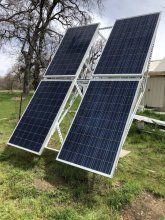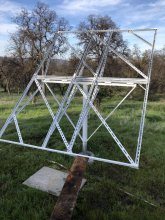Pneuma
New Member
- Joined
- Sep 6, 2020
- Messages
- 41
Hello everyone.
I am moving from Ny to Texas. going off the grid( No access what so ever to grid). I have been trying to educate myself on the Solar power topic as much as possible. The moving day is getting closer and so I have to get the spesification of my system down so I can just buy everything and hopefully they all work together.
I wanted to post my system here and ask you nice people to take a look at it and help me out please.
For my batteries I decited on a 24V:
For the inverter and charge controller I think Im better off going with all in one.
for solar pannels... I havent really decited on what brand or exactly what I am going to buy. I would love to get LG or Sunpower but also Rish Solar has been sitting well with me.
regardless of the brand I am thinking about 1150Watt( 3x350) To START WITH because I am kind of on a budget right now and decited to spend the majority of the money on the battery. and Also I have a limmited roof space on my to be RV.
I am planning on powering a Desktop a laptop a fridge and in hotter months obviously AC since you know Texas ... An instant watter heater bunch of lights and a vacuume once in a while.
I am not planing on runing anything 24/7 except for the fridge and I know I need to adjust my use. Thats going to be fun going from 875Kwatt a mounth !
Any comment is widley appreaciated!
Thank you for reading my post
I am moving from Ny to Texas. going off the grid( No access what so ever to grid). I have been trying to educate myself on the Solar power topic as much as possible. The moving day is getting closer and so I have to get the spesification of my system down so I can just buy everything and hopefully they all work together.
I wanted to post my system here and ask you nice people to take a look at it and help me out please.
For my batteries I decited on a 24V:
Grade A NEW 16PCS 3.2V176Ah Lithium Iron Phosphate Cell lifepo4 battery solar 24V
I am planning on Parallel two 24v 176AH to create a 24V with 352AH. I believe thats how you write it 8s2pFor the inverter and charge controller I think Im better off going with all in one.
Growatt 24V SPF 3000TL LVM – 3kW 120Vac Stackable Inverter 2kW MPPT Charge Controller Split Phase 120V/240V capable with two or more units
Or something similar. I really could use some help in this.for solar pannels... I havent really decited on what brand or exactly what I am going to buy. I would love to get LG or Sunpower but also Rish Solar has been sitting well with me.
regardless of the brand I am thinking about 1150Watt( 3x350) To START WITH because I am kind of on a budget right now and decited to spend the majority of the money on the battery. and Also I have a limmited roof space on my to be RV.
I am planning on powering a Desktop a laptop a fridge and in hotter months obviously AC since you know Texas ... An instant watter heater bunch of lights and a vacuume once in a while.
I am not planing on runing anything 24/7 except for the fridge and I know I need to adjust my use. Thats going to be fun going from 875Kwatt a mounth !
Any comment is widley appreaciated!
Thank you for reading my post





